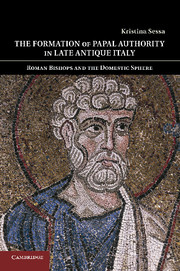Book contents
- Frontmatter
- Contents
- Acknowledgments
- Abbreviations
- Map Late Roman Italy
- Roman Bishops from Peter to Gregory I
- Introduction: Household Management and the Bishop of Rome
- Chapter 1 The Late Roman Household in Italy
- Chapter 2 From Dominion to Dispensatio: Stewardship as an Elite Ideal
- Chapter 3 Primus Cultor: Episcopal Householding in Theory and Practice
- Chapter 4 Overseeing the Overseer: Bishops and Lay Households
- Chapter 5 Cultivating the Clerical Household: Marriage, Property, and Inheritance
- Chapter 6 Mistrusting The Bishop: Succession, Stewardship, and Sex in the Laurentian Schism
- Chapter 7 The Household and The Bishop: Authority, Cooperation, and Competition in the Gesta Martyrum
- Conclusion
- Bibliography
- Index
Conclusion
Published online by Cambridge University Press: 05 December 2011
- Frontmatter
- Contents
- Acknowledgments
- Abbreviations
- Map Late Roman Italy
- Roman Bishops from Peter to Gregory I
- Introduction: Household Management and the Bishop of Rome
- Chapter 1 The Late Roman Household in Italy
- Chapter 2 From Dominion to Dispensatio: Stewardship as an Elite Ideal
- Chapter 3 Primus Cultor: Episcopal Householding in Theory and Practice
- Chapter 4 Overseeing the Overseer: Bishops and Lay Households
- Chapter 5 Cultivating the Clerical Household: Marriage, Property, and Inheritance
- Chapter 6 Mistrusting The Bishop: Succession, Stewardship, and Sex in the Laurentian Schism
- Chapter 7 The Household and The Bishop: Authority, Cooperation, and Competition in the Gesta Martyrum
- Conclusion
- Bibliography
- Index
Summary
The clergy of sardinia had long posed challenges to rome's leadership, but the decision of their bishop, Januarius of Cagliari, to place the administration of his church's patrimony in the hands of thieving local landowners was the last straw. Writing to Januarius in July of 599, Gregory sternly directed his suffragan to use only clerics as overseers in the future. Unlike “secular men,” he explained, the clergy are “approved by your office” and thus can be more easily punished. Similar to other crises explored in this book, this incident boldly underlines two facts about households and bishops in late antique Italy: the line between domus and ecclesia was never firmly drawn, and Rome's prelates viewed the breaching of the boundary as an opportunity for intervention in domestic matters. Gregory's solution, to separate the interests of individual households from those of the church by having Januarius manage his see's property directly, was intelligent but probably ineffective. Although clergy might be disciplined more efficiently than lay conductores, they were hardly impervious to the constant pressure of personal domestic allegiances. This was as true in the earliest moments of ecclesiastical history, when households literally provided the space, resources, and possibly even the leadership for Christian communities, as it was in the late sixth century, when the bishop of Rome struggled to govern an institution with its own nominally distinct personnel and legal property.
The very nature of Gregory's advice to Januarius, however, speaks to a more historically contingent development: the adaptation of household management as a model of government by late antique Roman bishops. Although oikonomia had oriented discussions of episcopal leadership since the early second century, it did not define the Roman bishop's identity and actions until the later fourth century, that is, well after Constantine's conversion and at the precise moment when Western senatorial aristocrats began to embrace Christianity in larger numbers. More exactly, the period from ca. 440 to 600 was the most fruitful time for the recalibration of household management as a discourse of Roman episcopal authority. While earlier prelates such as Siricius and Innocent made important inroads, it was their successors – Leo, Gelasius, Symmachus, Pelagius I, and Gregory – who articulated their influence and power more systematically in terms of domestic expertise. Rather than always being an important facet of the bishop's influence and identity, estate management became increasingly central over the course of the fifth and sixth centuries. Certainly the existing state of the evidence potentially mitigates this argument (i.e., the fact that medieval collection makers selectively preserved the letters of Rome's bishops); there might have once been hundreds of documents attesting to the interests of third- and fourth-century Roman prelates in oikonomia. Nevertheless, there are reasons to believe that we are witnessing historical change.
- Type
- Chapter
- Information
- The Formation of Papal Authority in Late Antique ItalyRoman Bishops and the Domestic Sphere, pp. 274 - 282Publisher: Cambridge University PressPrint publication year: 2011



